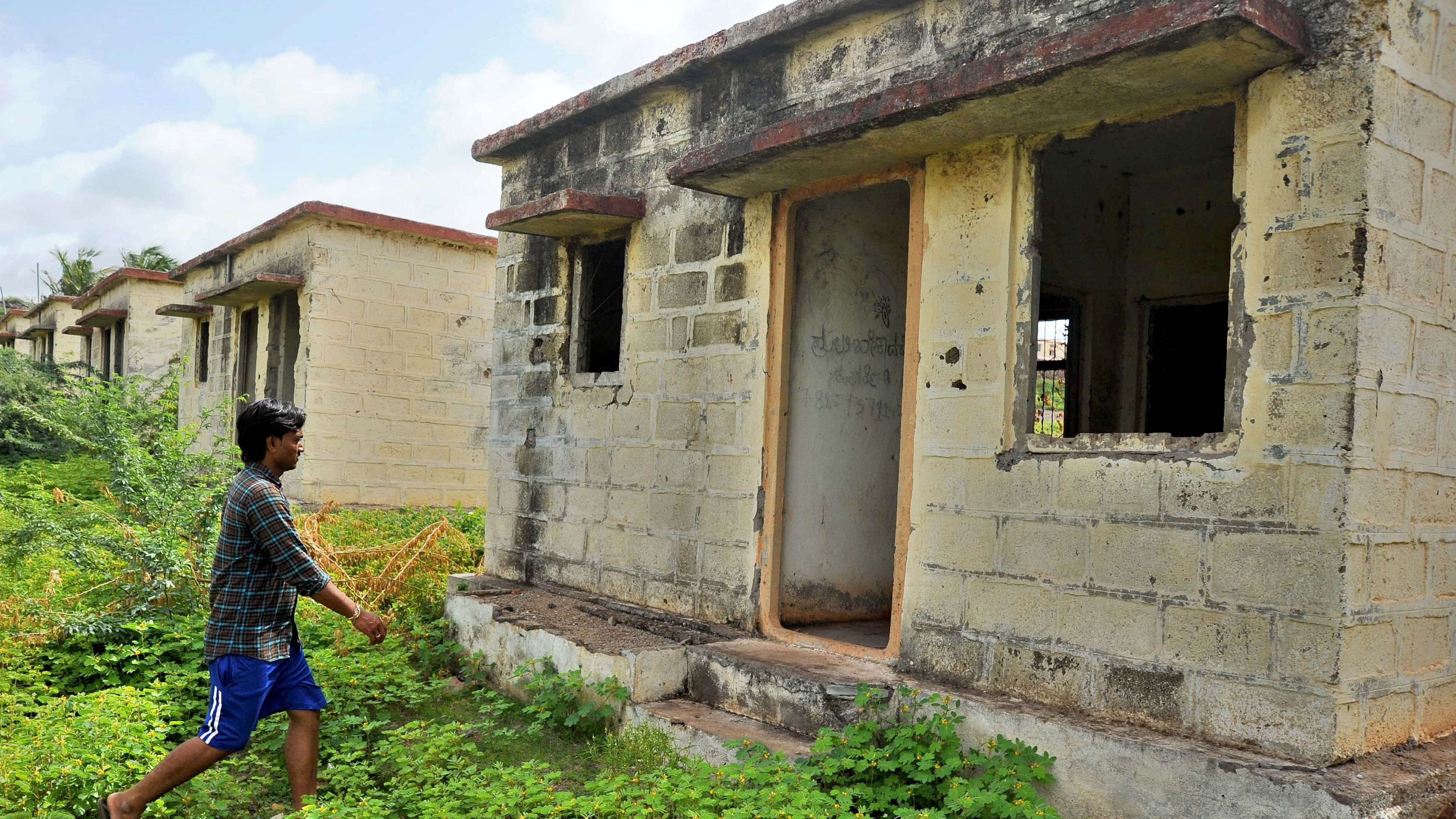
View of bad condition of houses built under Ashraya housing scheme at Kamatagi village in Bagalkot.
DH Photo: Pushkar V
Bagalkot: Datasets of various departments reveal the pathetic side of implementing pro-people schemes such as housing, Ganga Kalyana, scholarships, construction of hostels and schools that intend to provide long-term relief to beneficiaries.
Successive governments promised to build 4.61 lakh houses for BPL families under various schemes 2020-21 onwards. But the state could complete only 1.3 lakh houses, while 1.36 lakh houses are still under construction. Work on 1.91 lakh houses are yet to start.
Ganga Kalyana
The Ganga Kalyana scheme aims to provide borewells to individuals free of cost for Scheduled Castes and other similar caste groups.
According to data from Dr B R Ambedkar Development Corporation, it had sanctioned 1,314 borewells for 2022-23 and identified 909 beneficiaries. But in reality, only 19 borewells were sunk. These are classic examples of the failure of schemes.
A senior official from social welfare department told DH that the biggest hindrance in execution is political interference as most of these schemes are beneficiary-driven.
“Selecting beneficiaries is a tedious task and it changes every time the government or CM or ministers change. Between 2018 and 2023, the state saw 3 CMs and ministers changed multiple times. Identifying beneficiaries became troublesome. The process couldn’t take off,” the officer said.
Overlapping schemes
An official from the planning and statistics department told DH that another problem is that there are 1,856 schemes in operation and most of them overlap.
“Every CM comes with a new plan and new scheme to leave a legacy behind. The expenditure reforms commission and successive central finance commissions have recommended that overlapping schemes must be merged to avoid pilferages,” sources said.
According to him, of the 1,856 schemes, there are 335 that have a budget allocation of Rs just 1 crore, while 609 have allocation of just below Rs 10 crore. A total of 618 schemes are in the Rs 100-crore range and 294 schemes have budget outlay of more than Rs 200 crore.
Window for graft
“Schemes within Rs 1 crore and below Rs 10 crore constitute 51% of the budget. Once these schemes get allocations, the government starts feeling the pinch of garnering resources to fund schemes that need bigger outlays. Therefore, the delay in completing projects. This invariably leads to rising costs of tenders, opening a window for corruption,” sources said.
Former bureaucrat S M Jamdar told DH that there are three major reasons which lead to delay.
Tedious process
“First, the start of schemes is delayed. Second, neither politicians nor officers take them seriously. So, identifying beneficiaries is a tedious process as it is under the control of politicians and list keeps growing. Lastly, ruling dispensation never releases full amount for the schemes,” he said.
Another retired bureaucrat V Balasubramanian said “acute laziness” in the bureaucracy is the most impacting factor for the delay.
“If a scheme has to succeed, officers from ground level to top level have to sweat it out. For instance, once politicians clear beneficiary list, bureaucrats can speed up the process. As I have seen, politicians will not try to stop any scheme that brings them good name. It is bureaucrats at grassroots level who delay it for various reasons,” he said.
No accountability
Lack of accountability on the part of bureaucracy is another big factor why schemes get delayed.
“Our system itself is so corrupt that till date no politician or bureaucrat is punished for wrongdoings. So, beneficiaries get harassed,” he said.
Prof R S Deshpande, former director of Institute for Social and Economic Change (ISEC), said schemes are not ‘demand-based,’ but ‘supply-pushed’.
Missing mechanisms
“Shakti and Gruha Jyothi schemes fall under this category. Whenever government comes out with schemes, it fails to put implementation mechanisms in place. Most schemes are prepared at the last minute and many don’t know how to implement it. Identifying mechanism to implement takes a long time. In the process, CMs get changed, schemes become rudderless and take a backseat. This leads to high degree of pilferage,” he said.